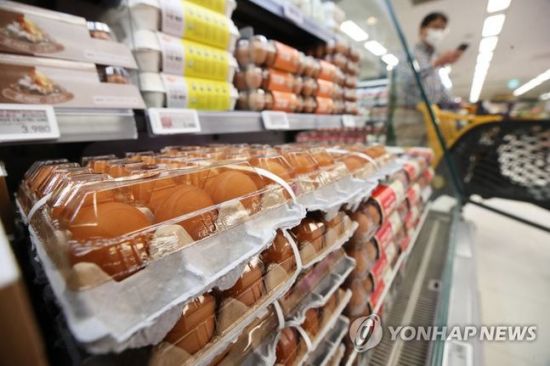Rice, green onions, red pepper powder, etc… “I’m afraid of grocery shopping”
A single plate of eggs 7432 won
Government plans to expand supply of key sacred goods ahead of Lunar New Year holidays

Eggs on display at the mart. As egg prices rose sharply due to highly pathogenic avian influenza, the wholesale price per plate reached 6,000 won. [이미지출처=연합뉴스]
[아시아경제 한승곤 기자] # Kim Mo, a 30-year-old office worker living on his own in Seoul, recently comes out of a sigh when he only goes to the mart. Mr. Kim sighed, saying, “Once the price of rice has risen, it will be difficult.” In particular, the burden is even greater for college students who live on their own by earning a part-time job without a certain income. Lee Mo, a college student in her twenties, said, “If things that you need to eat, such as rice and eggs, rise, your life will inevitably be shaken. Your plan for the month will be wrong.”
Recently, as the prices of domestic dining tables have risen unusually, the sighs of the common people continue. According to the consumer price trend for January released by the National Statistical Office, agricultural products rose 11.2% on average compared to the previous year. Rice (12.3%), as well as green onions (76.9%), red pepper powder (34.4%), and onions (60.3%), rose significantly.
In addition, eggs affected by the spread of highly pathogenic avian influenza (AI) jumped 15.2%. It is the largest increase since 20.3% in March last year. Pork meat rose by 18.0% and domestic beef by 10.0%, respectively.
In the midst of this, as the price of eggs rose sharply due to AI, the wholesale price per egg reached 6,000 won. According to the livestock distribution information of the Livestock Quality Assessment Service on the 5th, the wholesale price of a plate of eggs (30 special eggs) on this day was 5,955 won, reaching around 6,000 won.
The consumer price of a single egg surpassed the 7,000 won mark on the 28th of last month (7253 won), 22 days after it rose to the 6,000 won level at 6027 won on the 6th of last month. It continued to rise and recorded 7432 won the day before. Such egg prices are up 43.3% from the average in February last year and 21.6% from the previous month. The cost of producing eggs (10 special eggs) was 1924 won, almost double the average of 1005 won in February last year.
Lee Jung-hyun, head of the inflation trend of the National Statistical Office, announced the consumer price trend in January 2021 at the Sejong City Government Complex on the morning of the 2nd.

Citizens are shopping at the mart. Photos are not related to specific expressions in the article. [이미지출처=연합뉴스]
As the prices of agricultural and livestock products including grains rose, even processed foods using them as raw materials were affected. Pulmuone raised the price of bean sprouts and tofu, while Sampyo Foods and Dongwon F&B raised the price of canned food.
The Food and Agriculture Organization of the United Nations (FAO) said last month that the food price index including grains and meat reached the highest level in three years, saying, “Food inflation is now a reality.” This is why concerns about agflation, inflation caused by rising grain prices, are raised. Agflation is a compound word of agriculture and inflation. It is a new term that refers to a phenomenon in which general prices rise due to a surge in agricultural product prices.
As the prices of shopping carts are rising, the common people are complaining about their grievances. In particular, the common people who are reducing spending due to the Corona 19 situation complain that the burden is greater.
Mr. Choi, a 40-year-old office worker in his 40s, who said he was working in Seoul, said, “If the grains we eat as a basis increase, the rise will increase even more,” he said.
Another 30-year-old office worker, Mr. Lee, said, “There is a reason to go to the mart to buy things, but don’t you just go with a refreshing personality? But as prices rise, I get stressed out.”
Before the Lunar New Year holiday, the government plans to expand the supply of key sacred goods so as not to increase the burden of inflation. Kim Yong-beom, the 1st Vice Minister of the Ministry of Strategy and Finance, held a macroeconomic and financial meeting on the 2nd and said, “Ahead of the Lunar New Year, we will expand the supply of key sacred goods to prevent the inflationary burden of the common people. We will do our best to improve supply and demand by expanding imports and discharging stockpiles.”
Reporter Han Seung-gon [email protected]
